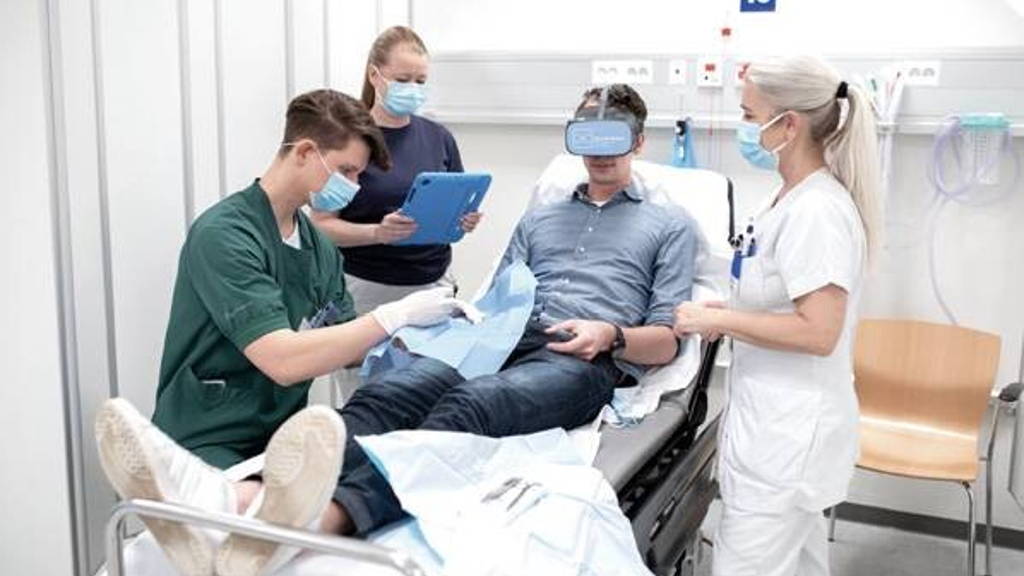The digital revolution in healthcare promotes more patient-centered care. Since the large-scale digitization of the Nijmegen Radboudumc in 2022, the hospital has been equipped with numerous innovative technological solutions. These technologies not only relieve patient stress and pain, but also help healthcare professionals personalize their care.
Patients are often stressed, scared and in pain when they are in the hospital, especially if they are there longer than average. Whereas medication used to be resorted to do something about this, nowadays there are all kinds of technological gadgets, which not only relieve stress and pain, but also make patients feel human again for a while.
Besides the now familiar VR glasses, patients in the Radboudumc have a tablet or smartphone with which they can control the lights themselves and open or close the curtains without having to get out of bed. They can even invite other patients or staff to come and have a chat via a remotely controlled digital sign near the door of the room on the outside.
Strengthening care relationships
What's special about VR technology is that it can be used not only for entertainment, but also to strengthen the bond between caregiver and patient. For example, a nurse can use a connected device to follow along with what the patient is seeing, thus helping to talk about the experience or explain how a particular game works.
"A few years ago, we had a patient who had broken almost all of her bones in a serious accident," one nurse recalls. "We encouraged her to use VR as therapy. She chose to go swimming with dolphins and was obviously very emotional during that experience. Afterwards, she told me that she used to go snorkeling on vacation all the time, but had had to stop doing so for health reasons. Her favorite memory was swimming with a mother dolphin and her baby. Thanks to VR, she could now relive that memory."
Digital ceilings
Babies are often too young for a VR headset, but Radboudumc has come up with a solution: digital ceilings. Through these ceilings, babies and young children keep in touch with the world outside the hospital. A nurse explains that there was once a child who spent his entire first year in the hospital. Through the digital ceiling, he was able to discover new worlds and his senses were stimulated. "When the digital ceiling was on, he was always happy. We like to see babies happy, of course, but what's even more important is that they feel comfortable. Because a hospital can be a pretty stressful environment. Digital technology can alleviate that stress for the whole family."
Better interoperability
Sanne van Alphen, Nursing Information Officer at Radboudumc, hopes that eventually these technologies can even allow young patients to go home faster and receive care remotely. She also hopes that communication and data exchange between different institutions will continue to improve. Van Alphen: "Doctors should be able to send information about their patient to our hospital or other hospitals so we don't have to ask the patient for their history. That takes an enormous amount of time that we would much rather spend on the patient himself."
This interoperability that Van Alphen hopes for is a strategic priority for 43 Member States, according to a WHO/Europe report. In 2023, WHO/Europe and the European Commission launched a joint project to strengthen health information systems and promote health data governance and interoperability across Europe. In the Netherlands, Nictiz published renewed ZiTA architecture principles for hospitals late last year with the aim of optimizing organizational structure and information governance to strengthen interoperability.
Positive picture of the future
According to David Novillo Ortiz of WHO/Europe, rapid technological advances offer hope for the future of healthcare. "Today's digital solutions in healthcare seemed like pure science fiction less than a decade ago. WHO/Europe is ensuring that all countries in Europe have access to safe and accessible health technologies."
Radboudumc's innovative approach to healthcare aligns perfectly with WHO/Europe's Regional Action Plan for Digital Health, which aims to develop patient-centered and scalable solutions to improve public health and healthcare systems in this digital age.






